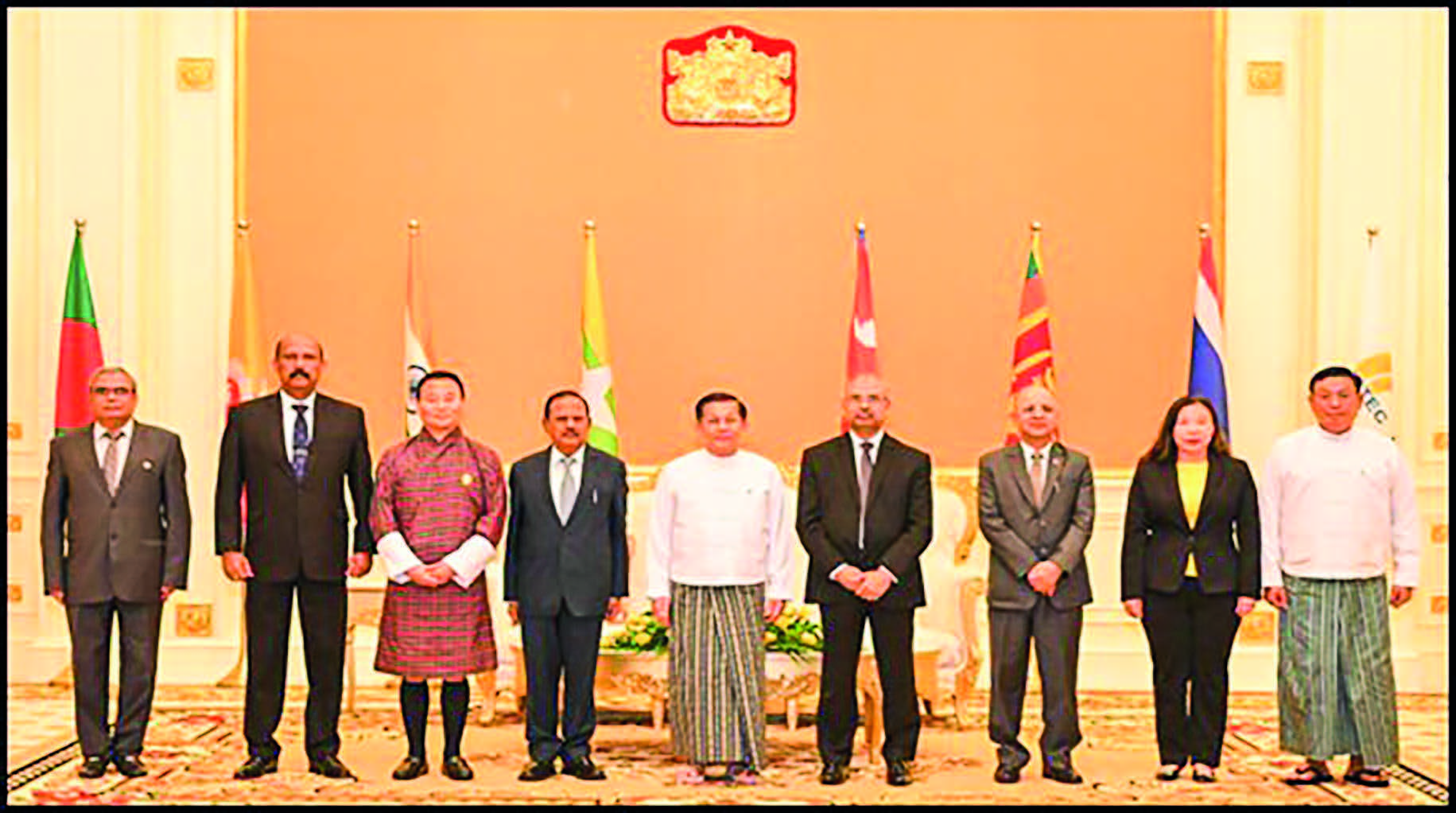By Min Khant
MYANMAR hosted the 4th BIMSTEC National Security Chiefs’ Meeting successfully on 24-26 July.
Security chiefs of Bangladesh, Bhutan, India, Nepal, Myanmar, Sri Lanka, and Thailand, as well as member states of BIMSTEC, attended the meeting. During the meeting, the participants frankly discussed the matters pertaining to combatting terrorism and narcotics, challenges of maritime security and cyber security, practical cooperation in information sharing in relevant security affairs, ongoing security affairs in the regions, and preparations to be made to overcome the possible security-related challenges.
National security advisers who attended the meeting, have highly vested powers in their respective governments and are the policy makers for international relations and national security affairs. Hence, their attendance and constructive talks were highly conducive to the SAC Government. The SAC Government strengthened its legitimacy because of the successful completion of such Senior Officials’ Meeting in Myanmar. Again, the meeting also provided ample opportunity for political, economic, and security cooperation and diplomatic prestige.
In particular, since neighbouring countries like Thailand, Bangladesh, and India are BIMSTEC member states, the ways to address armed conflicts and combat drug-trafficking along the border areas in a collaborative manner could be discussed.
BIMSTEC is a strong regional organization which is regarded as a product of the convergence of Thailand’s Look West Policy, which seeks to strengthen economic relations with neighbouring countries and beyond, and India’s Look East Policy, which seeks to cultivate economic relations closely with the nations of Southeast Asia.
BIMSTEC came into being on 6 June 1997. It was initially known as BIST-EC (Bangladesh-India-Sri Lanka-Thailand Economic Cooperation) and was comprised of Bangladesh, India, Sri Lanka, and Thailand. With Myanmar joining on 22 December 1997, the organization was renamed BIMST-EC (Bangladesh, India, Myanmar, Sri Lanka, Thailand Economic Cooperation). Bhutan and Nepal became new members of BIMSTEC in 2004. As of 2023, the BIMSTEC region is home to around 1.8 billion people, that is, nearly 22 per cent of the global population, with a combined gross domestic product (GDP) of USD 3.6 trillion. BIMSTEC is also considered a bridge between South Asia and Southeast Asia. Through this, it is an important organization to link the East Asia Region.
The BIMSTEC Charter prescribes that cooperation within the BIMSTEC will be based on respect for the principle of sovereign equality, territorial integrity, political independence, non-interference in internal affairs, non-aggression, peaceful co-existence, mutual respect and mutual benefit. It also states that all decisions will be based on the consensus.
BIMSTEC differs from other organizations, which are comprised of different countries with diverse societies, faiths, languages, and cultural heritage. All Member States are carrying out activities to promote active collaboration and mutual assistance on matters of common interest in the economic, social, technical and scientific fields.
BIMSTEC is working under four main mechanisms: Summit, Ministerial Meeting, Senior Officials’ Meeting and BIMSTEC Working Group Meeting.
It mainly aims to create collaboration for rapid economic and social development. Nonetheless, it comes to take into consideration not only traditional security threats but also nontraditional security threats due to geopolitics, transnational organized crimes, arms smuggling, and narcotics smuggling. It also focuses on maritime security because of the Bay of Bengal and the Andaman Sea.
During the 4th BIMSTEC National Security Chiefs’ Meeting, the Member States discussed matters and shared experiences to prevent the spread of terrorism and violent extremism and eliminate illegal narcotics smuggling in the region under the theme “Regional countries’ cooperation in combatting terrorism and illegal narcotics”. The meeting gave means, opportunities and ideas for cooperation in counter-terrorism in the host country, Myanmar, as well as the region. It also explored collaborative ways to prevent nontraditional threats.
Myanmar geopolitically plays a vital role in links between ASEAN countries and South Asian ones. The successful completion of the BIMSTEC National Security Chiefs’ Meeting is an excellent movement for Myanmar in diplomatic relations and gave it the potential to trade promotion with the BIMSTEC Member States.
It had many opportunities for making border trade cooperation with India, which had 1.4 billion people in the West, rather than relying on China alone in the East. Again, it could seek ways to trade with Middle Eastern and European countries through India, the leading nation among BIMSTEC Member States.
BIMSTEC can link the cooperation between the two regional organizations as it comprises some Member Countries of the Association of Southeast Asian Nations (ASEAN) and the Member States of the South Asian Association for Regional Cooperation (SAARC) as well.
Myanmar’s neighbouring countries, Thailand and Laos, are in ASEAN Member States. Likewise, its neighbouring countries like Thailand, Bangladesh and India have joined the BIMSTEC. The neighbouring countries in BIMSTEC have a righteous attitude towards Myanmar. They have a balanced view and cooperation for mutual interests. The active participation of the SAC Government, which is being blocked by diplomatic means, in BIMSTEC is very beneficial not only for BIMSTEC but also for Myanmar.
Since international terrorism and transnational crimes are posing threats to economic development and social progress in the BIMSTEC region, the meeting adopted policies and plans, including the exchange of information, to effectively combat terrorism and transnational crimes. In this regard, Myanmar is carrying out anti-narcotics measures.
Today, most global countries can no longer stand alone due to political, economic, social and security conditions. Only when it cooperates with another country or other countries will progress in the political, economic, social, and security sectors be achieved, and economic development will be made, too. Under these circumstances, regional organizations like BIMSTEC and ASEAN have been established to facilitate cooperation between the countries in the region.
Geographically, Myanmar, as a land connectivity between Southeast Asian and South Asian countries, can link a connection between BIMSTEC and ASEAN. I write this article stating that Myanmar is a unique country that can help combat terrorism in the security sector as well as eliminate narcotics and create not only the prospect but also a favourable environment for rapid economic development in the sub-region, the BIMSTEC’s vision.


